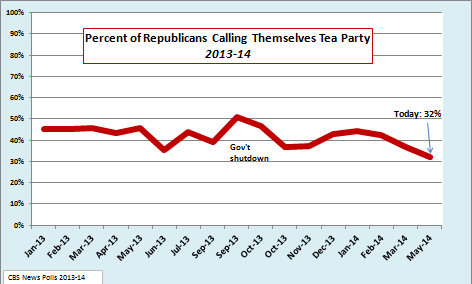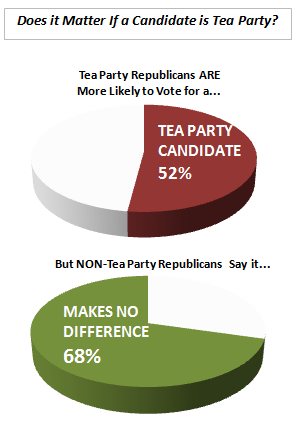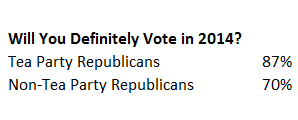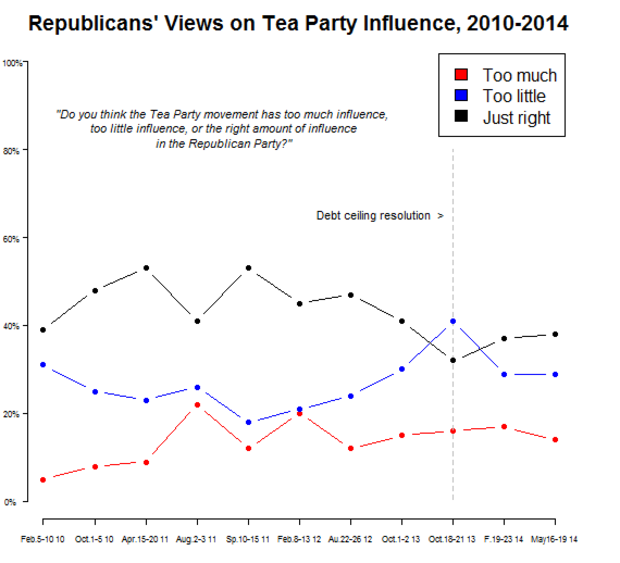The tea party may be down, but is it out?
By a lot of measures it's been a rough few weeks for the tea party: its favored candidates lost in all but of a couple of their big contests, losing convincingly in Senate races in Kentucky, North Carolina and Georgia, and in a host of House races too. Support for the movement nationally, even among Republicans, hit new lows in the latest CBS News poll.
But have reports of its demise been exaggerated? There are a lot of ways to measure tea party influence, and much of its changing fortunes are due to an influx of spending against its candidates, which describes a tactical change from Republican establishment groups and not entirely ideological differences.
This has roots in last fall's government shutdown. During that fight tea party support among rank-and-file Republicans did rise - see the small uptick on the line in the chart, above - as Republicans of all stripes rallied during the battle with congressional Democrats, but that burst was short-lived. Polls soon after showed the GOP as a whole bore the bulk of public anger over the shutdown, and the establishment wing (mostly, the party's formal congressional leadership) reportedly worried that the tea party's approach could anger more moderate and independent voters and cost them a chance at Senate control. Importantly, it also alienated business groups and more traditional party donors, who vowed to get involved in the primaries to push back against challenges.
It opened the proverbial spending floodgates (or maybe wallets is the better term) as establishment groups like the U.S. Chamber of Commerce actively got involved in Republican primaries, a battle previously left to only more conservative groups like the Club for Growth. The Chamber spent this year in those spotlight races, Kentucky, Georgia, Oregon, along with the House races in Idaho's 2nd and Pennsylvania's 9th districts in support of establishment-favored candidates.
The bulk of Republican voters say it doesn't matter whether a nominee is tea party or not. At best they seem neutral about the notion. While Republican tea party voters want to back tea party-affiliated candidates, the non-tea party Republicans (and that's most of them, as we've shown) overwhelmingly say it makes no difference to them.
So who, in particular, does the establishment decide to back? Again this appears to be as much about political pragmatism as ideology.
Political movements in the United States can either win elections (the most obvious way to score points) or they can affect the parties and people that do, and the latter has surely happened with the tea party and Republicans. One would be hard-pressed to find Republican candidates this year, including those from the so-called "establishment," whose issue platforms run starkly against much of what tea party voters want. Nor will you find Republicans running for re-election on the idea of reconciling with Democrats, or claiming to be the moderate in the race. That all speaks, as many have noted, to the influence of staunchly conservative and tea party voters.
The establishment is generally backing seasoned (translation: more electable) incumbents or current officeholders as nominees, no doubt a result of Republicans' lost opportunities from 2010 and 2012. Back then, when establishment and party leadership took a more hands-off approach on the primary processes and let tea party enthusiasm drive candidate selection, the result was a number of Republican candidates who'd never run for statewide or major offices.
Those outsider images seemed alluring at the time. But their campaigns faltered, and that fall, Republicans were left on the losing side of races they could have won.
On this front, the divide between the establishment and the tea party may still be most pronounced. The anti-Washington, anti-establishment views that drive many tea party activists tend to draw them to political newcomers, because candidates with ties to Washington are often seen as part of the problem, by definition.
This year, though, the establishment is betting that outside groups will come home in the end, which many be a function of enthusiasm. Tea party voters remain the most committed to voting in November - enthusiasm the Republicans still need to harness. (And which will keep giving the tea party added leverage, too.)
Many of those outside groups are coming around to support the very "establishment" candidate they'd opposed, but it is surely one of the key variables to watch this summer for whether the establishment's approach is working.
Republican rank-and-file voters continue to say, in the main, that the tea party has the "right amount" of influence on their party, not too much, not too little. Again, when we look at the trend on this we see the rallying effect during the shutdown, and a subsequent - but not substantial - dropoff. The "just right" numbers were higher in 2011, but the "too little" numbers are higher now too. In other words, Republicans don't all want more tea party influence, but they still aren't widely clamoring for less, either.
Long term, most Americans - as evidenced by low primary turnout - don't always connect how much the spring primaries affect November. But the Republican establishment is clearing acting on that idea. It remains a balancing act, as we always see within parties, between an activist base whose enthusiasm is needed, and the political realities of a party trying to get to 51 percent. The critical test will be whether the tea party has already pushed establishment candidates too far to the right to succeed in the general election, or whether it has still helped Republicans seize on a national mood.
Andrew Guess contributed to this report.




